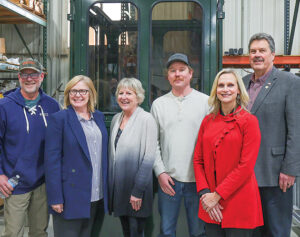For nearly 50 years, Spectro Alloys operated under the public radar. The Rosemount company today employs 150 workers who deploy an array of sophisticated technology to recycle millions of pounds of aluminum each year, but leaders stayed quiet about the company’s great jobs and positive environmental impact.
In 2020, Spectro Alloys President Luke Palen decided it was time to give the community a closer look at the company. With a few simple steps, Spectro started spreading the word about its work.
Spectro beefed up its company website with information about its operations and impact and circulated news about the company via an annual letter to 12,000 employees, community leaders, elected officials, and regulators.
Local and state leaders took note, realizing what a gem they have in their own backyard. That culminated in widespread public and financial support for the company’s $71 million expansion, scheduled to be completed in 2025. Minnesota’s Department of Employment and Economic Development (DEED) offered low-interest financing as well as $1.3 million in incentives for the project.
I attended the March groundbreaking for the 90,000-square-foot facility, which included speeches by Gov. Tim Walz and Rosemount Mayor Jeff Weisensel. But behind the glitz of the formal event, I was struck to hear privately from Spectro employees how joyful they are — about their jobs, their company, and the meaningful work they do. And who wouldn’t be?
Spectro uses cutting-edge technology to transform items headed for landfills into the aluminum used in new cars, appliances, lawn mowers, light fixtures, and other products. Significant investments in pollution control systems limit the impact on the air and water around the facility. Because aluminum recycling uses 95% less energy and releases 95% less carbon dioxide than traditional aluminum production, Spectro estimates it saves enough energy to power 200,000 homes each year. Reduced carbon dioxide emissions are the equivalent of taking 80,000 cars off the road.
And these benefits come from Spectro’s current operation. The expansion will add the capacity and technology for recycling consumer scrap (including beverage cans), opening new markets, and creating 50 additional jobs. Palen says current employees can advance their careers if they take advantage of Spectro’s leadership and training programs.
Spectro has a long track record of providing great jobs. The company offers competitive salaries, profit sharing, tuition reimbursement, and ongoing training programs. Greg Palen, Luke’s father, who in 1989 bought the scrap metal company that became the recycling giant, points out that many employees are related — there are fathers, sons, and cousins on the payroll. There’s no stronger endorsement of a positive work environment than recommending it to family.
Spectro also annually contributes tens of thousands of dollars to area charities, including a donation to the United Way of Hastings that directs funds for mental health issues, fentanyl poisoning, and student hunger.
I, for one, am thrilled that Palen has been more assertive about promoting his company. Spectro has a long history of protecting the environment, providing great jobs, and donating to its community. The company’s public reputation has grown exponentially, which is great for the company, and frankly, all manufacturers.
Many people simply drive by the manufacturing facilities in their communities with little curiosity about what goes on inside. One of our missions at Enterprise Minnesota is to help shed light on those operations. Spectro offers a great example of how to do that.
Return to the Summer 2024 issue of Enterprise Minnesota® magazine.


